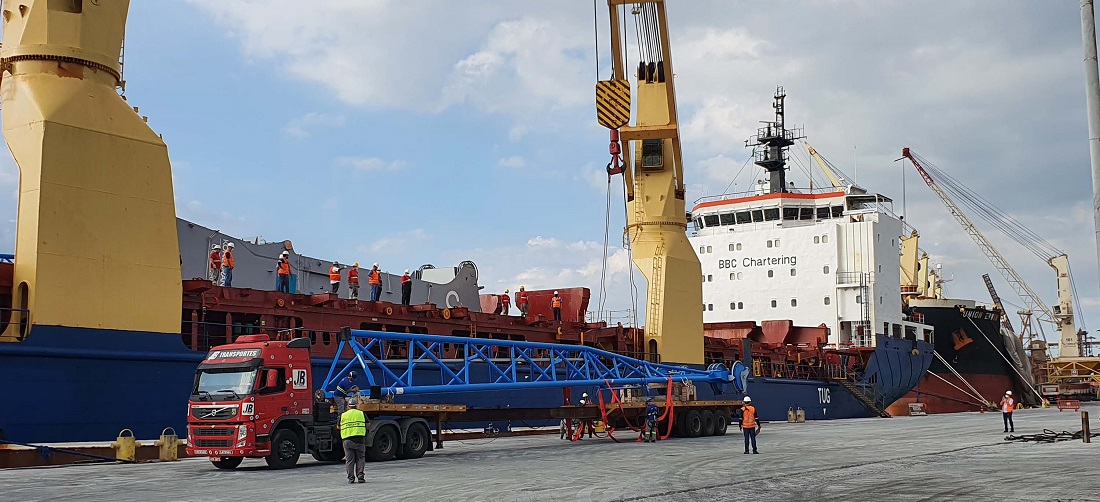
Paranaguá’s initiative to partner with port operators leads to greater productivity
Jun, 22, 2020 Posted by Sylvia SchandertWeek 202027
The partnership between the port authority and Paraná port operators is increasing the port’s productivity. This week, for example, a new shiploader began operating at berth 206. A new mobile crane for unloading fertilizer is also being installed at berths 208, 209, and 211.
The investments are private and are part of the contracts signed between the operating companies, lessees, and the government. “The current management model follows the landlord lines, where the port authority is responsible for managing the port and providing the necessary structure for cargo handling activities. The private sector, on the other hand, is responsible for the superstructure: equipment, warehouses, and labor ”, explains the CEO of Paraná ports, Luiz Fernando Garcia. In this model, the reversible assets, acquired by the private sector, become part of the Union’s equity after the contract period.
The investment of R$30 million in the shiploader at berth 206 was made by Bunge. The equipment made the first operation, handling 32,000 tons of soybean meal on the ship Siana, which left for Singapore. The shiploader has a dust collection system, which reduces the emission of particles in the air when loading ships.
Rocha Terminal Portais will install a new mobile crane for unloading fertilizers at berths 208, 209, and 211. To do so, an investment of 3.6 million euros will be required. The crane has a 100-ton loading capacity and grabs to unload 28 cubic meters. The equipment arrived on June 6th and should start operating in the coming days.
In July, it will be two years since the port used portainers to handling containers. These portainers are the largest in Brazil, with 66 meters of boom and 50 meters of free span from the track, reaching up to 24 rows on the ship. The acquisition is part of the expansion made by the Paranaguá Container Terminal (TCP). Investments in the equipment exceeded R$600 million, and is considered the largest work in Brazil’s port sector in recent years.
The Fospar terminal, operator of solid bulk imports at berths 200 and 200A, in the Port of Paranaguá, foresees an increase of 600,000 tons per year starting this year, with the conclusion of the recent investments – about R$225 million – and resumption of use of the pier’s internal berth (200A).
In an own optimization project, which started in 2016 and was completed last year, the company built a new warehouse, dredged the internal berth and equipped the terminal with new conveyor belt systems for unloading (from ships) and also for loading trucks and wagons, as well as implementing systems and technologies to streamline logistics operations. With the recent improvements, the company now has two warehouses, two conveyor belt systems for unloading products, and four other loading systems, used to load both wagons and trucks that take the products to the destination.
In the retro area, a major investment in expansion was made this year by the company Cattalini, one of the main operators of liquid bulk in the Port of Paranaguá. Since April, the new tank center, CT4, came on-stream. In the 25,700 square meter area, there are 17 tanks with a capacity to store up to 91,000 m3 of liquids. The new CT, according to Cattalini, increases the company’s static capacity by 17.5%. With the new facilities, the operator has 133 tanks, 610,000 m³ for the storage of various products, distributed in five centers for tanking, customs and warehouses.
DataLiner data shows that the main products exported via Paranaguá are soy and its derivatives, corn, sugars, and poultry. The main imported products are petroleum oils, bituminous minerals, and fertilizers. The graph below shows the imports and exports carried out by the Port of Paranaguá month by month starting in 2016 in tons:
Source: DataLiner (To request a DataLiner demo click here)
The chart below shows cargo handling at the Port of Paranaguá by company in the period from January 2019 to April 2020:
Source: DataLiner (To request a DataLiner demo click here)
-
Ports and Terminals
Mar, 23, 2023
0
Santa Catarina-based cold storage regains halal cargo certification
-
Shipping
Feb, 20, 2024
0
Log-In’s SEA Cabotage Service Makes Inaugural Call at TCP
-
Grains
Aug, 08, 2023
0
VLI sets in motion exports from record-breaking 2023 corn harvest
-
Ports and Terminals
Oct, 16, 2021
0
Angra port resumes general cargo handling



